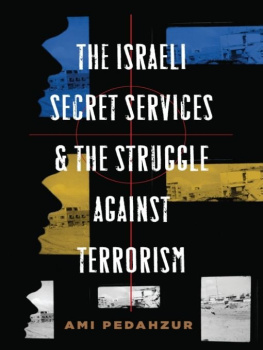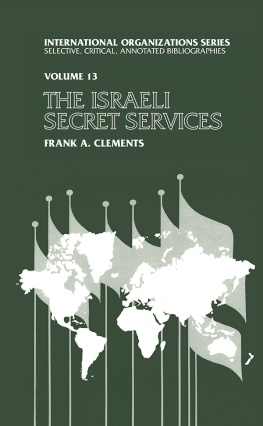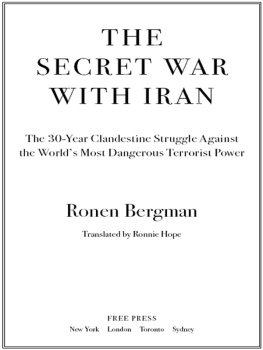All rights reserved.
Published in the United States by Random House, an imprint and division of Penguin Random House LLC, New York.
R ANDOM H OUSE and the H OUSE colophon are registered trademarks of Penguin Random House LLC.
If someone comes to kill you, rise up and kill him first.
THE ISRAELI INTELLIGENCE COMMUNITY guards its secrets jealously. Its near-total opacity is protected by a complex array of laws and protocols, strict military censorship, and the intimidation, interrogation, and prosecution of journalists and their sources, as well as a natural solidarity and loyalty among the espionage agencies personnel.
All glimpses behind the scenes have, to this day, been partial at best.
How then, it might reasonably be asked, to write a book about one of the most secretive organizations on earth?
Efforts to persuade the Israeli defense establishment to cooperate with the research for this project went nowhere. Requests to the intelligence community that it comply with the law by transferring its historical documents to the State Archive and allowing publication of materials fifty years old or more were met with stony silence. A petition to the Supreme Court for an order forcing compliance with the law was dragged out over years, with the complicity of the court, and ended with nothing but an amendment to the law itself: The secrecy provisions were extended from fifty to seventy years, longer than the history of the state.
The defense establishment did not merely sit with folded arms. As early as 2010, before the contract for this book was even signed, a special meeting was held in the Mossads operations division, Caesarea, to discuss ways of disrupting my research. Letters were written to all former Mossad employees warning them against giving interviews, and individual conversations were held with certain ex-staffers who were considered the most problematic. Later in 2011, the chief of the General Staff of the IDF, Lieutenant General Gabi Ashkenazi, asked the Shin Bet to take aggressive steps against the author, claiming that I had perpetrated aggravated espionage by having in my possession classified secrets and using classified material in order to disparage me [Ashkenazi] personally. Since then, several actions have been taken by various bodies to stop publication of the book, or at least large parts of it.
The military censor requires the Israeli media to add the words according to foreign publications whenever it mentions secret actions attributed to Israeli intelligence, primarily targeted assassinations. This is to make it clear that the existence of the publication does not constitute official acknowledgment of Israels responsibility. In this sense, then, this book must be taken as a foreign publication whose contents do not have any official Israeli confirmation.
None of the thousand interviews upon which this book is basedwith sources ranging from political leaders and chiefs of intelligence agencies to the operatives themselveswere approved by Israels defense establishment. Most of the sources are identified by their names. Others understandably feared being identified and are therefore referred to by their initials or nicknames, in addition to any details about them I was able to provide while still keeping their identities secret.
I have also made use of thousands of documents given to me by these sources, all of which are referenced for the first time here. My sources never received permission to remove these documents from their places of employment, and certainly did not have permission to pass them on to me. This book is thus about as far as possible from an authorized history of Israeli intelligence.
So, why did these sources speak with me and supply me with these documents? Each had his own motive, and sometimes the story behind the scenes was only a little less interesting than the content of the interview itself. It is clear that some politicians and intelligence personneltwo professions highly skilled in manipulation and deceptionwere trying to use me as the conduit for their preferred version of events, or to shape history to suit themselves. I have tried to thwart such attempts by cross-checking with as many written and oral sources as I could.
But it seemed to me that there was often another motive, which had much to do with a particularly Israeli contradiction: On the one hand, nearly everything in the country related to intelligence and national security is classified as top secret. On the other hand, everyone wants to speak about what theyve done. Acts that people in other countries might be ashamed to admit to are instead a source of pride for Israelis, because they are collectively perceived as imperatives of national security, necessary to protect threatened Israeli lives, if not the very existence of the embattled state.
After a time, the Mossad did manage to block access to some of my sources (in most cases only after they had already spoken to me). Many more have died since I met them, most of natural causes. Thus, the firsthand accounts that these men and women have given for this bookmen and women who witnessed and participated in significant historic eventsare in fact the only ones that exist outside the vaults of the defense establishments secret archives.
Occasionally, they are the only ones that exist at all.
MEIR DAGAN, CHIEF OF the Israeli Mossad, legendary spy and assassin, walked into the room, leaning on his cane.
Hed been using it ever since he was wounded by a mine laid by Palestinian terrorists he was fighting in the Gaza Strip as a young special-ops officer in the 1970s. Dagan, who knew a thing or two about the power of myths and symbols, was careful not to deny the rumors that there was a blade concealed in the cane, which he could bare with a push of a button.
Dagan was a short man, so dark-skinned that people were always surprised to hear that he was from Polish origins, and he had a potbelly with a presence of its own. On this occasion he was wearing a simple open-necked shirt, light black pants, and black shoes, and it looked as if hed not paid any special attention to his appearance. There was something about him that expressed a direct, terse self-confidence, and a quiet, sometimes menacing charisma.
The conference room that Dagan entered that afternoon, on January 8, 2011, was in the Mossad Academy, north of Tel Aviv. For the first time ever, the head of the espionage agency was meeting with journalists in the heart of one of Israels most closely guarded and secret installations.
Dagan had no love for the media. Ive reached the conclusion that it is an insatiable monster, he would tell me later, so theres no point in maintaining a relationship with it. Nevertheless, three days before the meeting, I and a number of other correspondents had received a confidential invitation. I was surprised. For an entire decade I had been leveling some harsh criticism at the Mossad, and in particular at Dagan, making him very angry.









